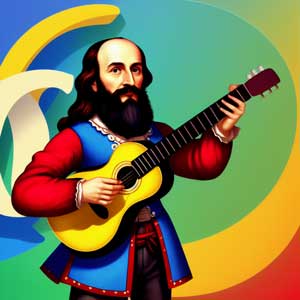Google has announced swift strides in deploying novel generative AI functionalities to counterbalance the remarkable achievements of OpenAI's ChatGPT. In a multifaceted proclamation on Monday, the company unveiled Bard, a novel chatbot designed to rival ChatGPT. Additionally, they introduced a conversational search feature primed to yield diverse multimedia search outcomes, along with a novel generative AI API that empowers developers and creators to fashion their individual applications.
Dubbed the "New Bard AI Chatbot," Google's CEO Sundar Pichai detailed in a recent blog post that Bard, akin to ChatGPT, leverages Google's potent natural language processing model LaMDA (Language Model for Dialogue Applications). The chatbot is slated for a forthcoming release to an external cadre of "trusted testers." Post refinement of safety protocols and addressing other intricacies, the tool will be disseminated for public use. Pichai refrained from specifying the exact timeframe for universal access. Pichai elucidated that Bard draws upon online data to furnish novel, superior responses. He articulated, "Bard is an outlet for creativity and a conduit for inquisitiveness, whether you're elucidating recent revelations from NASA's James Webb Space Telescope to a young learner or delving into the world of premier football strikers and acquiring practice routines."
The subsequent segment of the declaration centers on integrating generative AI into Google's search product, aimed at comprehensive inquiries that lack a single definitive answer. If a user poses a question like, "Which is easier to learn, the piano or guitar, and how much practice does each necessitate?" the search engine might yield an amalgamation of multimedia content addressing various facets of the inquiry. Pichai elaborates that this feature grants users a holistic perspective, enabling exploration of multiple viewpoints and a deeper dive into related subjects. The rollout of these new search capabilities is anticipated to commence on Google Search in the near future.
The final revelation pertains to Google's impending provision of tools to facilitate developers and creators in constructing AI-infused applications, deploying AI cloud services, and orchestrating AI-assisted advertising initiatives. Pichai specifies that starting next month, Google will extend access to its Generative Language API, initially powered by LaMDA, to individual developers, creators, and enterprises. This API can be harnessed by end users to forge their customized natural language applications. Google will collaborate with partners like Cohere, C3.ai, and Anthropic to broaden the API's reach.
These announcements embody Google's broader strategy to infuse its products and services with AI capabilities. It might also reflect a strategic move to regain the limelight from OpenAI's prominent ChatGPT. While OpenAI pioneered expansive natural language processing models, it was Google that birthed the BERT model in 2018, underpinning the existence of present NLP-based chatbots. Pichai accentuates that Google's explorations in generative AI are nascent, affirming their ongoing investment in AI to shape an AI-centric future. "Our voyage into AI is just commencing, and the zenith is yet to be attained," Pichai affirmed during a recent earnings call.

